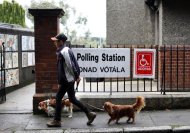
Ireland's Prime Minister Enda Kenny vowed to push
forward with reform of the upper house of parliament after voters
rejected his plan to abolish the senate to save the bailed-out eurozone
nation money.
In a surprise blow for Kenny after he personally led the campaign to
ditch the senate, voters in a referendum on Friday narrowly opted to
keep the 60-member house, according to results announced late Saturday.Final results revealed that 51.7 percent voted in favour of keeping the senate, or Seanad Eireann, while 48.3 percent wanted to scrap it. Turnout was just 39.2 percent with about 1.2 million voters.
"Sometimes in politics you get a wallop in the electoral process. I accept the verdict of the people," Kenny told reporters outside Dublin Castle after the result was announced.
"The process of change in politics is something that we want to continue with.
"And now that the people have given a very clear decision in respect of the Senate, I think it's important to assess how best the Senate can contribute effectively to that process of reform and I'll reflect on that over the period ahead."
Opinion polls had suggested voters would likely back Kenny's proposal to scrap the senate, which had the support of the coalition government parties and some of the opposition.
The prime minister had described the upper house as elitist and undemocratic, saying its closure could save the nation 20 million euros ($27 million) a year.
Opponents said the senate, which was created in 1937, should be reformed instead of abolished.
Micheal Martin, leader of the opposition Fianna Fail party, urged Kenny to press on with "real reform of our parliament and government".
"This result is complete rejection of the Government’s strategy of talking about reform but simply increasing their own power," he said in a statement.
Many Irish blame their country's politicians for failing to properly manage the "Celtic Tiger" economic boom, which ended in Dublin entering a European Union-International Monetary Fund bailout in November 2010 after a decade of growth collapsed.
Voters also backed the creation of a new Court of Appeal in a separate referendum Friday. It passed by 65.2 percent in favour to 34.8 percent against.
Dublin hopes the new court will alleviate the pressure on the heavily backlogged Supreme Court.
Austerity and slashed growth forecasts
Slashed growth forecasts
Kenny had taken many by surprise, even those in his own Fine Gael party, when he announced in the run-up to the last general election that he would put plans to scrap the upper house to the people.
He pointed out that other small EU nations had scrapped their upper houses to save money.
But critics accused Kenny's party of hiding behind a promise of savings to centralise power in the government's hands -- and closing the door on wider political reform.
Historically, many senators tend to be politicians who failed to gain a seat in a general election or those hoping to win a seat in the lower house at a future election.
The upper house is the less powerful house of parliament, often reduced to rubber-stamping legislation from the lower house.
Its ability to delay bills passed by the lower house for 90 days is its most powerful function, but that has only occurred twice in 75 years.
The referendum vote came ahead of another austerity budget in Ireland on October 14, almost three years since it entered the EU-IMF bailout.
The IMF on Friday slashed its growth forecasts for Ireland after predicting weaker consumer demand and export growth.
The IMF, which formed a central part of Ireland's 85-billion-euro international rescue, said it expects the Irish economy to grow by 0.6 percent this year, down from a previous forecast of 1.1 percent.
Ireland's economy went through a period of turmoil in the run-up to the 2008 global financial crisis and after, amid soaring government debt, a property-market meltdown, a banking crisis and surging unemployment.
Ireland had been known as the "Celtic Tiger" economy for its double-digit growth spanning a decade from the mid-1990s.
No comments:
Post a Comment